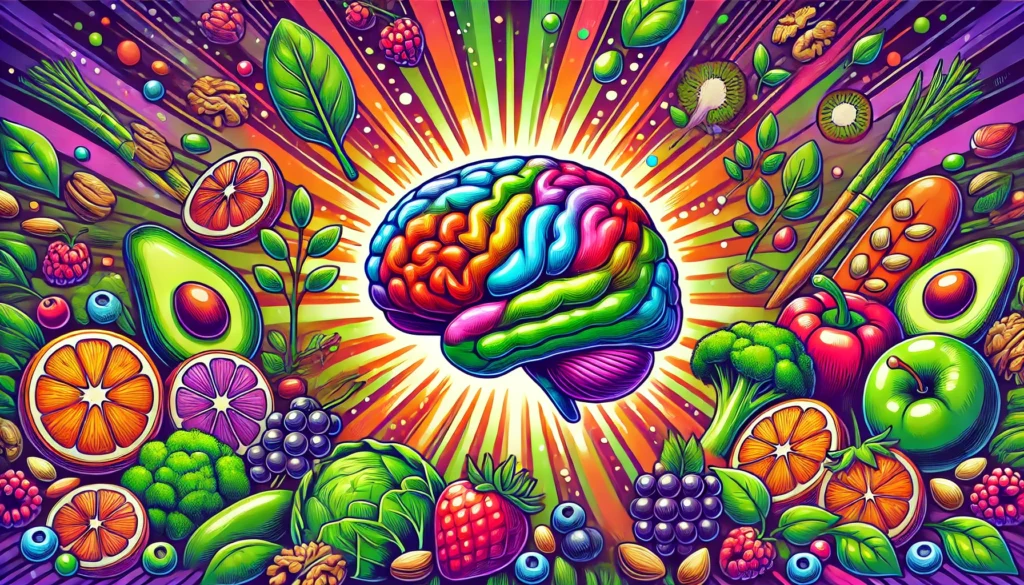
Want to listen instead?
🍽️ Brain Boosting Foods: How Mindful Eating Can Protect Against Cognitive Decline
- As we age, maintaining cognitive function becomes an essential aspect of overall health. Interestingly, diet plays a critical role in protecting our brain against cognitive decline, Alzheimer’s disease, and even diabetes-related cognitive impairment. The concept of Mindful Eating — being aware of what we eat and how it impacts our body — can serve as a vital tool in preserving brain health.
- At Mindful Diabetes Inc., we are passionate about equipping you with knowledge to make better dietary choices. As part of our ongoing Pathways to Wellness series, today we explore the power of food in preventing cognitive decline, particularly for individuals managing diabetes. Through science-backed strategies and a mindful approach to nutrition, we’ll uncover how your daily meals can serve as a shield for your brain.
❤️ Join Us in Preventing Type 3 Diabetes
Your gift supports scientifically backed prevention programs, cognitive-health education, and AI tools that help families reduce the risk of Alzheimer’s-like symptoms linked to diabetes.
Mindful Diabetes Inc. is a 501(c)(3) nonprofit — all donations are fully tax-deductible.
The Link Between Diet and Cognitive Health
Our diet doesn’t just fuel our body; it significantly impacts brain health too. Nutrient-rich foods and mindful eating practices can enhance cognitive function and reduce the risk of Alzheimer’s disease, especially for those managing diabetes.
How Diet Influences Cognitive Function
- Blood Sugar and Brain Health: Elevated blood sugar levels are harmful to brain cells and can contribute to conditions like Type 3 diabetes (often referred to as Alzheimer’s disease linked to insulin resistance). Diets rich in whole foods help stabilize blood sugar levels, protecting cognitive function.
- Oxidative Stress and Inflammation: Processed foods and high-sugar diets cause oxidative stress and inflammation, which can accelerate brain aging. Antioxidant-rich foods, such as berries and leafy greens, combat this damage.
- Gut-Brain Connection: The gut microbiome plays a significant role in brain health. Diets high in fiber and probiotics enhance the gut-brain connection, reducing cognitive risks associated with diabetes.
Nutrients that Boost Brain Health
- Omega-3 Fatty Acids: Found in fish like salmon, omega-3s support brain function and help prevent Alzheimer’s.
- Antioxidants: Berries, dark chocolate, and nuts contain antioxidants that reduce brain inflammation.
- Vitamins B and E: These nutrients, abundant in leafy greens, whole grains, and nuts, are linked to improved memory and cognitive function.
Mindful Eating for Brain Protection
- Focus on Whole Foods: Mindful eating encourages focusing on nutrient-dense foods such as fruits, vegetables, whole grains, and lean proteins.
- Limit Processed Foods: Processed foods high in sugar, unhealthy fats, and artificial additives contribute to poor cognitive health.
🌟 Try Our Free Wellness Tools!
Set the high score in our Mindful Eating Game, explore JEIR, or dive deeper into the science behind our AI-driven prevention tools!
🤖 Try JEIR — Your AI Wellness Guide 🎮 Play the Mindful Eating Game 📘 Read About the Mindful Eating Game 🤖📘 Read About the AI Behind JEIRCognitive Decline and Diabetes: A Dual Challenge
For individuals living with diabetes, the risk of cognitive decline is significantly higher. This relationship stems from shared risk factors such as insulin resistance, inflammation, and cardiovascular issues. Here’s how diabetes and cognitive health intertwine and how diet can help.
Understanding the Diabetes-Alzheimer’s Connection
- Type 3 Diabetes: Research has coined the term Type 3 diabetes to describe the cognitive decline linked to insulin resistance in the brain. Managing diabetes through mindful eating can delay or prevent this risk.
- Insulin Resistance and the Brain: Insulin is crucial for brain cell health, and poor insulin regulation, common in diabetes, contributes to brain aging. Foods that support insulin sensitivity, like whole grains and vegetables, can help manage this risk.
How Diet Can Slow Cognitive Decline in Diabetes
- Low Glycemic Index (GI) Foods: Eating foods that release glucose slowly into the bloodstream, such as oats, legumes, and sweet potatoes, helps stabilize blood sugar and reduce brain inflammation.
- Fats and Cognitive Protection: Healthy fats, especially omega-3s, can support better insulin function and protect against Alzheimer’s disease. Consider adding fatty fish, chia seeds, and flaxseeds to your diet.
The Power of Probiotics and Fiber
- Gut Health’s Role: Research indicates that maintaining a healthy gut microbiome can reduce cognitive decline, particularly in people with diabetes. Probiotic-rich foods, such as yogurt, and fiber-rich foods, like legumes, improve gut health, which, in turn, supports brain function.
Building a Brain-Protective Diet with Mindfulness
A brain-healthy diet doesn’t have to be complex. Simple, mindful eating strategies can help you prioritize foods that support both cognitive health and diabetes management.
Brain-Boosting Foods to Include
- Leafy Greens: Rich in vitamins and antioxidants, greens like spinach and kale help combat oxidative stress in the brain.
- Berries: These fruits are packed with antioxidants, which help protect brain cells from damage.
- Fish and Nuts: Omega-3-rich foods like salmon and walnuts support cognitive health and reduce inflammation.
Mindful Eating Practices
- Slow Down and Savor: By paying attention to your food, you can enhance digestion, improve nutrient absorption, and make healthier choices.
- Portion Control: Mindful eating involves being aware of portion sizes, which helps prevent overeating and maintains steady blood sugar levels.
Hydration and Cognitive Function
- Stay Hydrated: Dehydration can negatively affect brain function. Drinking water regularly, along with including hydrating foods like cucumbers and oranges, can keep your brain sharp.
Conclusion
Mindful eating is a powerful tool in protecting your brain from cognitive decline, especially for those managing diabetes. By choosing nutrient-rich, whole foods and practicing mindful eating, you can support both your cognitive and metabolic health. Whether you are managing blood sugar levels or aiming to reduce your Alzheimer’s risk, the connection between diet and brain function is undeniable.
At Mindful Diabetes Inc., we continue to explore and share valuable insights in our Pathways to Wellness series. Join us on this journey to better health by embracing mindful eating practices and fueling your body and brain with the nutrients they need to thrive.
📖 Continue Exploring 🌐
Don’t stop here! Dive deeper into the fascinating connection between mental wellness and physical health in our upcoming blogs. There’s always more to discover and explore.
💌 Stay Informed and Inspired 📬
- Subscribe to our newsletter for the latest insights, tips, and updates on the mindful path to better health. Together, we’ll continue to unlock the secrets of a balanced and vibrant life.
- Thank you for your continued support and readership. Here’s to a healthier, happier you! 🌈💚




